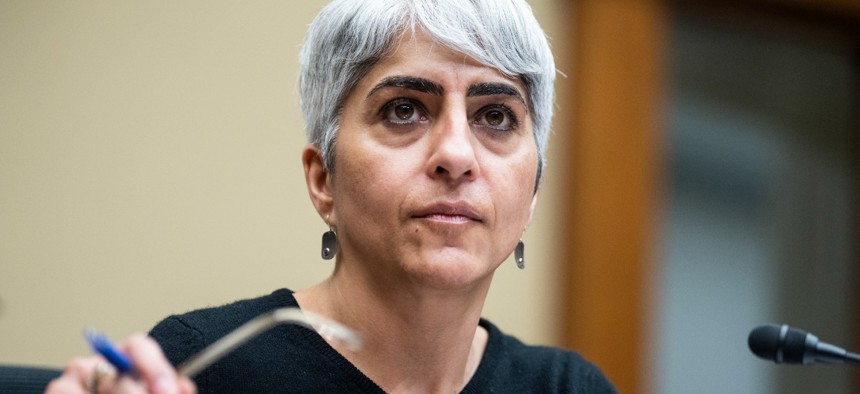
OPM Director Kiran Ahuja said that as a practical matter, the change in operating status should not have much of an effect on agencies. Tom Williams/CQ-Roll Call, Inc via Getty Images
OPM Will End Agencies’ Maximum Telework Status Next Month
The move follows White House guidance last week instructing federal agencies to reduce the use of workplace flexibilities following the end of the COVID-19 national emergency.
The Office of Personnel Management on Tuesday announced that it will end the use of maximum telework as part of the federal government’s operating status next month, following President Biden’s planned expiration of the COVID-19 public health emergency.
The public health emergency is set to expire on May 11. In a memo to agency heads Tuesday, OPM Director Kiran Ahuja announced that as a result, the federal government’s HR agency will no longer recommend that agencies remain “open with maximum telework flexibilities” as part of a governmentwide operating status.
“For the last several years, executive departments and agencies have taken steps for the effective, orderly and safe increased return to the workplace, and many federal employees have completed reentry,” Ahuja wrote. “We have maintained the COVID-19 governmentwide operating status until now to preserve maximum flexibility for agencies to learn from work environment innovations and to allow for agencies to adjust their reentry plans in the most appropriate way considering the needs of each agency. As a practical matter, we do not expect this operating status change to have significant impact on agency and workforce readiness.”
OPM’s operating status announcements apply to federal agencies within the Washington, D.C., region. Prior to the pandemic, the announcements were used primarily in instances of severe weather, such as snow storms, or in the event of other regional commute disruptions.
Ahuja stressed that although OPM’s recommendation for maximum telework was ending, agencies should still balance the Office of Management and Budget’s call for “substantially increased meaningful in-person work at federal agencies” with the benefits associated with continued use of workplace flexibilities, including increased productivity, employee engagement, and recruitment and retention of workers.
“OMB’s memorandum informed agencies of an expectation to increase meaningful in-person work while still using flexible operational policies,” she wrote. “Agencies should continue to strategically use telework and remote work policies in support of their workforce plans moving forward while capitalizing on the benefits of meaningful in-person work.”
In the days since OMB published its telework guidance, which called on agencies to develop a new system to continuously monitor telework’s positive and negative impacts on service delivery, federal employee groups continued to suggest that while it appears well-meaning and rooted in evidence-based policymaking, the White House should have solicited input from agency HR officials and labor groups earlier in the process.
“OMB’s emphasis on agency flexibility, evidence-based policy and balance is commendable,” said Marcus Hill, board chairman of the Senior Executives Association. “SEA encourages OMB to increase upfront stakeholder engagement on memoranda impacting the workforce. Earlier and broader engagement in this case would have greatly strengthened this memo.”
Hill noted that: “Many agency leaders, chief human capital officers and employee organizations are already working on crafting policies exactly like what OMB directed. These policies rely upon data and experience in considering some employees’ desire to work remotely and balancing the need for on-site work. Stakeholder engagement mitigates duplicative efforts and garners buy-in from those executing the guidance.”
National Treasury Employees Union National President Tony Reardon said OMB’s focus on increasing in-person work prior to evaluating telework’s effectiveness is backwards.
“We appreciate OMB’s recognition of the benefits of telework,” he said. “However, it is disappointing that this guidance seems to assume that agencies will determine they should increase in-person work before agencies have reported on the effectiveness of their current operational policies. In NTEU’s opinion, the federal government should first assess productivity and then adjust as needed. We are concerned that this assumption undermines the pro-telework stance that has been a hallmark of this administration from day one.”
And despite multiple overtures within OMB’s guidance toward Republican lawmakers’ complaints about declining customer service—which some Democrats and employee groups attribute instead to a combination of the pandemic and chronic understaffing at several agencies—the memo did not assuage the concerns of House Oversight and Accountability Committee Chairman James Comer, R-Ky., who compared the memo to a decades-long policy on LGBTQ+ Americans serving in the military.
“House Republicans have pressured the Biden administration to address the issue of prolonged pandemic-era telework and it is finally discussing it,” Comer said in a statement. “However, OMB managed to issue a 19-page memo that shed virtually no light on when federal employees are returning to their offices—or under what conditions continued elevated levels of telework may be warranted. Based on today’s briefing with OMB, ‘don’t ask, don’t tell,’ is the best way to characterize the Biden administration’s telework policy.”







